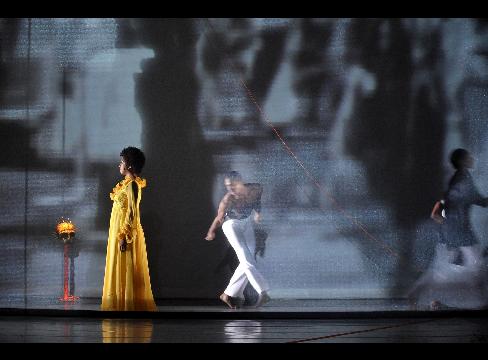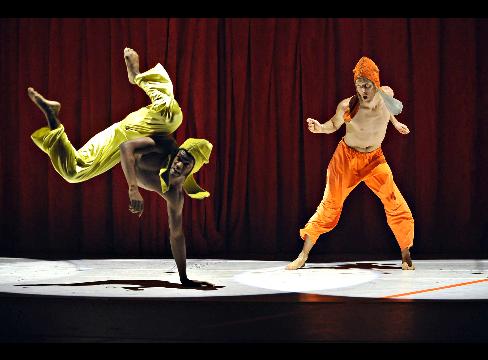This article originally appeared in the Culture section of Bloomberg News on October 2, 2008.
Oct. 2 (Bloomberg) — Bill T. Jones, most often given to raving and ranting about the world’s downside, does a welcome, if ironic, about-face with “A Quarreling Pair,” featuring the gaiety, verve, and sometime vulgarity of vaudeville.

Tracy Ann Johnson plays two sisters, adventurous Rhoda, seen here, and timid Harriet, during a performance of Bill T. Jones’s “A Quarreling Pair” at the Brooklyn Academy of Music’s Next Wave Festival in New York, on Sept. 29, 2008. Photographer: Stephanie Berger/BAM via Bloomberg News
At the Brooklyn Academy of Music, where it inaugurates this year’s Next Wave Festival, the show takes off from Jane Bowles’s brief puppet play of the same title, written in the mid-1940s. Aging spinster sisters of conflicting temperaments, Bowles’s Miss Harriet and Miss Rhoda are nevertheless inextricably bound, living together in emotional claustrophobia. Harriet is too timid to venture beyond querulous banal exchanges with Rhoda, who yearns to escape — to live in a wider world and contribute to it — but never can.
Typically, Jones provides an up-to-date, postmodern take on the circumstances. He begins, pointedly, by having one actress — the magnetic Tracy Ann Johnson — play both sisters. He lets Rhoda out of her prison but denies her a happy ending.
Harboring a romantic instinct for wanting to help people and also fancying herself a jazz singer, Rhoda fails at both.

Dancers Antonio Brown, left, and Paul Matteson take part in a performance of Bill T. Jones’s “A Quarreling Pair” at the Brooklyn Academy of Music’s Next Wave Festival in New York on Sept. 29, 2008. Photographer: Stephanie Berger/BAM via Bloomberg News
She ruins her cabaret act by leaving her mobile phone on — talking to the sister she left behind. She then manages to hook up with a sleazy Mexican vaudeville show, where an abusive drag queen co-opts her as a dresser and victim. Reduced to wandering the gray streets, she’s rejected even by the suffering multitudes.
No Retreat, No Surrender
Nevertheless, Rhoda refuses to retreat to the bland, frustrating safety of home and sister. If degrading and discouraging adventures represent the real world, so be it.
As in much of Jones’s work, the plotline is occasionally fuzzy, but the dancers of the Bill T. Jones/Arnie Zane Company, celebrating its 25th anniversary, are terrific — swift, precise, balletic, jazzy and acrobatic at once. Jones’s choreography for them is particularly memorable in the “exotic” showbiz acts, where the performers’ shenanigans are etched in acid. It’s less effective in the passages for the tired, poor and instinctively hostile masses. Jones’s affection for characters intent on pushing life to extremes appears to be far stronger than his empathy with figures worthy of pity.
A theatrical multimedia man, Jones, is ably abetted throughout by Bjorn Amelan (set design), Liz Prince (costumes), Robert Wierzel (lighting), Janet Wong (video design) and a trio of musicians: Wynne Bennett, Christopher William Antonio Lancaster, and George Lewis Jr.
No Jones production lacks its thorny issues, which usually come in multiples. In “A Quarreling Pair,” Jones hints at the question of what makes any couple or group able to co-exist. He also wonders, if only in a whisper, if it’s possible to improve the world and, if not, whether grace lies in trying anyway.
Best of all, though, he’s asking loud and clear if performers — often folks who like to sing, dance and cavort — shouldn’t occasionally be allowed to shed art’s deeper and darker concerns and just let the good times roll. The answer to that last one is a heartfelt yes.
Through Oct. 4 at BAM’s Howard Gilman Opera House, 30 Lafayette Ave., Brooklyn. Information: +1-718-636-4100; http://www.bam.org.
© 2008 Bloomberg L.P. All rights reserved. Reprinted with permission.



